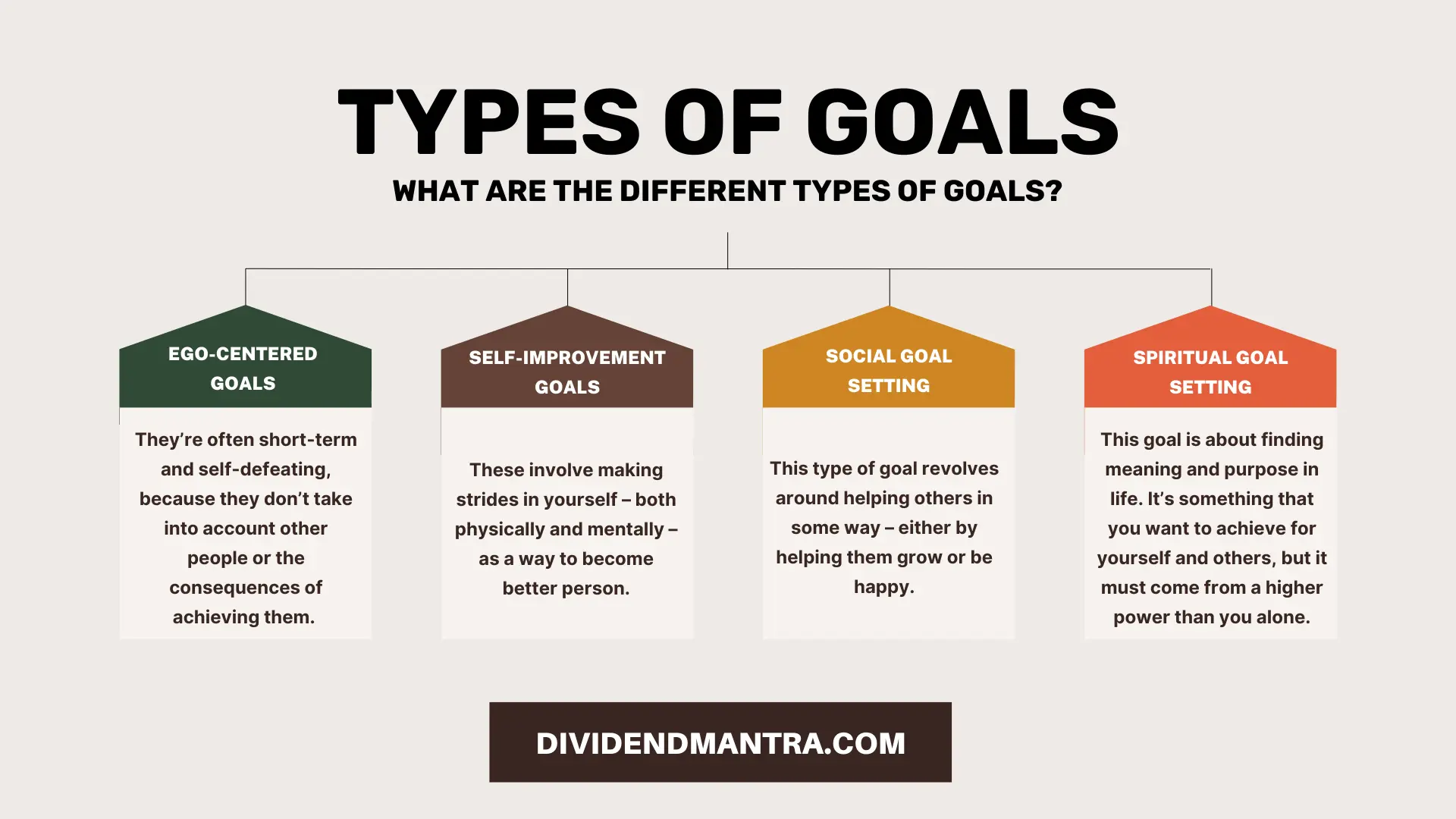Personal Goals Examples: Benefits, Mistakes Your Should Avoid & More
Personal goals examples can be very individualized and can be as simple or complex as the individual desires. Many people keep written goals to help them stay on track and achieve their objectives, while others use a more visual method such as setting specific dates for reaching a certain goal. Each person’s goal will vary depending on what they are striving for.
When it comes to setting personal goals, many people struggle with what exactly they should be aiming for. This is especially true for those who have never had to set goals before. There are many things that people want to achieve in their lives. Some people want to become successful businessmen or lawyers, others want to start their own businesses, and still, others want to become famous artists or writers.
Whatever your personal goals may be, in this article, we will provide some examples of personal goals that are both achievable and motivating.
Goal Setting: How Do You Set Personal Goals?
Setting a goal can be one of the most difficult things to do, but it’s also one of the most important things you can do for your personal growth. There are many ways to set goals, and no one way is better than another. However, there are some basic steps that all goal setters should follow.
First, identify what you want to achieve. This might be something as simple as making more money or getting better grades in school. Once you know what you’re trying to achieve, make sure that it’s something that is achievable for you. Don’t set goals that are too far out of your reach or that will take a long time to achieve.
Next, think about how you will go about achieving your goal. You might need to find a partner or hire help to help you reach your goal.
Types of Goals: What Are the Different Types of Goals?
There are different types of goals that people may have in their lives. Some goals might be more short term, such as getting a promotion at work. Other goals might be more long term, such as saving for a down payment on a house. There are also different types of goals based on what motivates them. These include:
i. Ego-Centered Goals: These are focused on satisfying your own desires and needs. They’re often short-term and self-defeating, because they don’t take into account other people or the consequences of achieving them.
ii. Self-Improvement Goals: These involve making strides in yourself – both physically and mentally – as a way to become better person. They’re long term and typically lead to personal satisfaction.
iii. Social Goal Setting: This type of goal revolves around helping others in some way – either by helping them grow or be happy.
iv. Spiritual Goal Setting: This goal is about finding meaning and purpose in life. It’s something that you want to achieve for yourself and others, but it must come from a higher power than you alone.
Some people might want to achieve a goal because they feel like they need to, while others might want to achieve a goal because they enjoy it. Ultimately, the type of goal that someone has will depend on their individual preferences and motivations.
What Are the Benefits of Having Personal Goals?
Many people believe that having personal goals is one of the best ways to achieve success. Studies have shown that individuals who have specific, measurable targets to work towards are more likely to be successful than those who do not. Here are some of the benefits of having personal goals:
i. Personal goals give you a sense of purpose. When you know why you’re doing what you’re doing, it’s easier to stay motivated.
ii. They help you set and track deadlines. If your goal is to lose weight, for example, knowing when your next weight loss goal is will help keep you on track.
iii. They create a sense of accountability. Knowing that other people are watching and judging your progress can be incredibly motivating.
iv. They provide a roadmap for success.
How Can You Develop a Personal Goal Plan?
Everyone has different goals, and what works for one person might not be the best plan for another. The key is to find something that you’re really passionate about and make it your goal. Here are some tips on how to develop a personal goal plan:
i. Figure out your passions. What are your interests that give you the most joy? These can be things like spending time with friends, getting outdoors, learning new things, or achieving success in your career. Write down everything that brings you happiness and put it into a list. This will help you figure out what’s important to you and keep you focused on your goals.
ii. Set realistic expectations. It’s important to remember that everyone’s journey is different and there are no guarantees when it comes to reaching your goals.
What Are Five Common Mistakes People Make When Creating Their Goal Plans?
Many people make common mistakes when creating their goal plans. Some of the most common mistakes include:
i. Not setting specific goals: When you don’t have specific, measurable goals to work towards, it’s difficult to stay on track.
ii. Setting goals that are too easy or too hard: Making your goals challenging but achievable is key to success.
iii. Not taking time for reflection: Revisiting your goals regularly helps you stay on track and adjust your strategy as needed.
iv. Not putting in the effort required: Setting a goal is one thing, but making it a reality takes work and dedication.
v. Focusing on the wrong things: Make sure your goals reflect what’s important to you
Others include not having a realistic timeframe for achieving the goals, and not taking into account other factors that could impact their success e.g finances and time constraints, not writing down their goals regularly, not setting deadlines for themselves, skipping steps in the goal plan that are essential for success, and focusing on the wrong aspects of success.
Setting Smart Goals: Specific, Measurable, Achievable, Relevant and Time-Bound
Setting SMART goals is one of the most important things you can do to reach your personal and business goals. SMART goals are specific, measurable, achievable, relevant and time-bound.
Specific means that your goal should be clear and concise. Measurable means that you should be able to quantify how close you are to achieving your goal. Achievable means that it is possible for you to achieve your goal, given the resources and time available to you. Relevant means that your goal should be relevant to your own personal and professional development. Time-bound means that your goal should have a deadline by which it must be achieved.
Breaking Down Your Goal: What Are the Specific Steps You Need To Take in Order To Achieve Your Goal?
There are a few key things to keep in mind when breaking down your goal into specific steps.
The first is to define your end game. What do you want to achieve? What do you want to be able to say to yourself or others once you’ve accomplished it? Once you know what you’re looking for, it’s easier to figure out what steps are necessary in order get there.
The second is that sometimes the most important step is the first. Take some time again and rethink about what steps will help you get started on your journey. This could include setting measurable goals, creating a plan of action, and identifying resources or allies who can assist you along the way.
Once you have an idea of where you’re headed, it’s time to start taking making progress.
Example of Personal Goals That You Can Set for Yourself
As we have shown you, setting personal goals is a key part of any successful life. It helps us to stay on track and achieve our desired outcomes. In fact, research has shown that goal setting can lead to increased productivity, better mental health, and even more success in life. So what are some examples of goals that you might want to set for yourself?
Some common goals include things like losing weight, improving your work performance, or becoming more financially secure. But there’s no need to be limited to these types of goals – you could also set goals related to your personal interests or passions. For example, you might want to start a blog about fashion trends or learn how to play the violin faster. The key is that you identify what matters most to you and make a plan for achieving it.
Here are some common examples of personal goals that will hopefully be able to help you get started:
1. Lose Weight
Losing weight is a personal goal that many people set for themselves. However, there are many different ways to achieve this goal. Some people might choose to diet while others might exercise more. There are also a variety of weight loss supplements available on the market. Whatever method or combination of methods someone decides to use, it is important to be consistent with it over time in order to see results.
2. Get in Shape
One easy goal to set is to get in shape. You don’t have to be a professional athlete or even particularly active to benefit from getting in shape. A good starting point would be to aim for 30 minutes of aerobic activity five days per week and two hours of muscle-building activity on the other days. If you can meet these simple guidelines, you’ll be on your way to improving your health and fitness level—without paying for a gym membership!
3. Learn a New Language
Learning a new language can be a great way to broaden your horizons and achieve personal goals. There are many reasons to learn a new language, including increasing your job prospects, making friends from around the world, and improving your cultural awareness.
When choosing which language to learn, it’s important to consider the level of difficulty and availability of resources. Many languages are more difficult than others, but there are plenty of options available no matter how busy you are. If you’re looking for a challenge, choose one of the harder languages. If you done have more time on your hands, consider one of the easier options.
Once you’ve chosen which language to learn, the next step is to set some new personal goals for yourself. One goal could be to improve your speaking skills so that you can communicate with people around the world.
4. Save Money
Most people would agree that saving money is a good idea. If you’re able to do so, it can help you achieve other personal goals, like buying a new car or taking vacation trips. In fact, if you are trying to save money, you’re not alone! According to a study by Bankrate.com, one in three people are trying to save money each month. And while there are many different ways to do this, setting personal goals is one of the best ways to get started.
Here are tips for setting personal savings goals:
i. Make a list of your needs and wants and figure out how much you spend on each category every month.
ii. Decide which expenses are most important to you and find ways to reduce or eliminate them from your budget.
iii. Track your progress over time and adjust your budget as needed in order to reach your savings goals.
iv. Set smaller goals that you can achieve easily rather than trying to save a lot of money all at once. Trying to save money by cutting back on your expenses will only lead to disappointment if your goal is too ambitious. Instead, focus on saving money toward smaller goals that you can realistically accomplish.
v. Get organized! When it comes to finances, chaos equals disaster. Having all of your expenses in one place will make budgeting and tracking much easier. This could include using a budget planner, setting up a consolidator online, or creating an expense tracker on your phone.
vi. Shop around for the best deals.
vii. Complete a budget and stick to it
viii. Create a debt repayment plan
One important thing to keep in mind is that every person’s needs and wants are different, so what might work for one person won’t necessarily work for another. It’s important to figure out what works best for you and then go all in on making those changes.
5. Get a Promotion
Another one of the most common personal goals is getting a promotion. Promotions can come in all different forms and can be very rewarding, both financially and intellectually. If you want to get a promotion, here are some things you can do to help:
First, make sure that your skills match the position you want to pursue. Second, stay current on company developments and keep up with new trends. Third, develop relationships with key people at your company and demonstrate your value proposition. Fourth, be proactive and take on extra responsibilities when offered. Fifth, stay humble and never take yourself too seriously. Sixth, don’t wait for something to happen; take action now!
6. Find a Partner
Finding a partner is one of the most important goals that you can set for yourself. It can be difficult to find someone who you are compatible with, but by setting goals and working towards them, you can make it easier. Below are some examples of personal goals that you can set to help you find a partner:
i. Set a date for when you want to find a partner and start advertising. This will help you narrow down your search and make sure that all of your bases are covered.
ii. Be open to meeting new people and exploring different interests. This will help you find someone who is compatible with your lifestyle.
iii. Make sure that you are physically and emotionally healthy. This will help ensure that the relationship is healthy as well as long lasting.
7. Retire Early
Retiring early is yet another example of a personal goal that you can set for yourself. If you are considering retiring early, there are a few things you should do to make the transition as smooth as possible.
First, figure out what your income needs will be after you retire. This will help you determine how much money you need to have saved up to cover your costs. Second, create a realistic retirement timeline in which you plan on retiring when your income is stable and able to provide the lifestyle that you desire. Finally, make sure that your retirement savings plan is structured in such a way that it will allow for an easy transition into retirement.
8. Start a Business
The goal of starting a business can be daunting, but it’s an excellent way to set yourself up for success. Here are some personal goals you can set for yourself if you’re interested in starting your own business: Here is how you make $1000 a month in passive income.
i. Determine what you want your business to do and who your target market is.
ii. Research the legal requirements and costs associated with starting a business in your area.
iii. Create a business plan that outlines how you will achieve your objectives and target market.
iv. Make sure you have the resources necessary to start and operate your business, including money, equipment, and employees.
v. Network with other entrepreneurs to learn from their experiences and gain support along the way.
vi. Persevere through tough times – businesses go through ups and downs, so be prepared for setbacks.
vii. Be passionate, but realistic, about your business; if you are not satisfied with the progress, do something new.
viii. Know that it is a two-way process – you will be learning and growing as much as your business is.
Methods of Tracking Progress: What Tools or Methods Do You Use To Track Your Progress Towards Your Goals?
There are many different methods of tracking progress towards goals. Some people use tools, while others simply keep track of what they have done. Regardless of the method used, it is important to be able to track progress so that steps can be corrected and the goal can be reached.
Some common tools for tracking progress include calendars, to-do lists, and checklists. Calendars can help with scheduling time slots for activities and can also be used to track deadlines. To-do lists are a good way to remember what needs to be done and when it needs to be done. Checklists can help with making sure all the necessary steps have been taken in order to reach a goal.
Other people use simple paper or electronic journals in which they write down what they have done each day or week. This helps them stay organized and it reminds them of what has been accomplished.
Putting in the Effort: Hard Work Leads to Success
The saying, “put in the effort, and you will get results” is often true. Hard work leads to success. People who put in the extra effort are more likely to achieve their goals than those who don’t.
There are a number of reasons why hard work leads to success. First and foremost, hard work is always rewarded. Even if you don’t reach your goal right away, eventually you will get there if you continue putting in the effort. Second, hard work builds character. It teaches people how to be persevering and determined in the face of setbacks. Finally, hard work leads to skills and knowledge that can be used in future endeavors. By practicing these skills and learning new information, people become better equipped for life challenges they may encounter down the road.
Motivating Yourself Towards Goals: How Can You Stay Motivated Through Tough Times?
Motivating yourself towards goals can be difficult during tough times. Staying motivated can be a challenge, but there are ways to keep yourself going.
Keep a positive attitude. When you’re feeling down about your goals, take some time to reflect on your successes. Remember the motivation behind your goal and focus on that instead of the obstacles in your way.
Find someone to support you. Ask a friend or family member for moral support, or join a supportive online community forum. Talking with others who understand what you’re going through can help keep you motivated.
Set small goals that are achievable. When it seems like all hope is lost, break Your larger goal into smaller tasks that you can complete easily and feel good about yourself for having done so. This will give you some sense of accomplishment even when progress is slow.
Celebrating Progress Towards Goals: What Should You Do When You Reach a Milestone in Your Goal?
Progress towards a goal is always rewarding, and reaching a milestone in your goal is an exciting time. When you reach a milestone, what should you do? Here are some tips to help make the celebration even more special:
i. Write down your accomplishments. This way, you can relive the experience and celebrate each moment with pride.
ii. Set a date for a celebratory dinner or party. Invite friends and family who have helped you get this far, and let them know about the event.
iii. Display pictures of your progress throughout the house or office. This will give others who have been supportive motivators along the way a place to gaze fondly at your hard work.
iv. Make a video diary of your journey to date. Upload it onto YouTube or another website so that everyone can catch up on your progress over time.
Extra Takeaways for Living a Successful Life: Tips on How To Achieve Your Personal Goals
1. Write Down Your Personal Goals
If you want to achieve your personal goals, it is important to write them down. This will help you focus on what you need to do in order to reach your goal. Writing down your goals also allows you to track your progress and make adjustments as necessary.
Here are some tips for writing down your personal goals:
i. Decide what the goal is. This might be something as simple as “save money” or “get a better job.”
ii. Be specific about your goals. Don’t just say “I want to become a better person.” State specifically what qualities or abilities you want to improve upon.
iii. Make a list of the steps necessary to achieve the goal. These could be things like buying a car or registering for a class.
iv. Rate each step on a scale from 1 (very easy) to 10 (very difficult). For instance, rating registering for a class as 5 might mean that you plan on reading all the materials before signing up and attending every meeting.
v. Visualize achieving your goal as often as possible.
vi. Keep the document updated so that you can see how far you have come and where you still need to go.
vii. Reward yourself for making progress towards your goal!
2. Set Deadlines for Yourself
If you want to achieve something, set deadlines for yourself. This is a tip that has helped many people in the past and it can help you too. If you don’t set deadlines, you may find it hard to achieve your goals.
When setting a deadline, make sure it’s realistic. If you set a deadline for finishing a project but your project takes longer than you thought, resentful and frustrated will be the result. Set smaller deadlines rather than no deadline at all; this way if something does come up and the project isn’t finished by the original due date, that’s okay.
There are times when it’s difficult to set deadlines because we’re afraid of failure or stress. Sometimes we underestimate how long something will take or what obstacles we’ll face on our way to success. But set deadlines anyway. It will help keep you going.
3. Use a Tracking Tool To Make Sure You’re on Track
Tracking your progress is an essential part of staying on track with your goals. There are a number of different tools you can use to help you keep track, and the one that works best for you will depend on your personal preferences and needs.
Some people prefer a simple spreadsheet to track their progress, while others prefer more visual tools. The important thing is to find something that works for you and makes tracking your progress easy.
One of the most important things about tracking your progress is making sure you don t lose sight of what s important. If you have set yourself a goal and hit some bumps in the road, it s important not to get discouraged. Keep at it, and eventually, you will reach your destination!
4. Find an Accountability Partner
Setting goals is a great way to achieve success, but it can be hard to stay on track if you’re working alone. That’s why it’s important to find an accountability partner! This person can help keep you accountable and on track so that you can reach your goals.
i. Look for someone who shares your interests and goals. Not only will this person be supportive, but they’ll also be able to provide helpful advice when needed.
ii. Make sure that your accountability partner is willing and able to meet regularly in order to keep the momentum going. If not, set up a plan for how you’ll still make progress without them.
Finally, remember that it takes both effort and consistency to reach our goals – don’t give up on yourself just because things get a little difficult at times!
5. Set Some Time Aside Each Week To Reflect
Set aside some time each week to reflect on your goals. Reflecting on your goals can help you identify and prioritize them, as well as give you a plan of action to achieve them. By taking the time to reflect, you’ll also increase your chances of success.
Reflection time should be a time where you are free from distractions and can focus exclusively on your goals. Make sure that this time is specific and not during busy times of the day or when you are feeling overwhelmed. Write down what you want to achieve in the next week and what steps you need to take to get there. Break these steps down into manageable chunks so that you know exactly what to do. Set smaller, more achievable goals rather than thinking about the entire goal at once. Once you have drafted your plan for the next week, set a deadline for yourself so that you don’t procrastinate or lose momentum. Take actionable steps towards your goal every day even if it’s small.
Conclusion
In conclusion, setting personal goals is an important part of any healthy lifestyle. By taking some time to think about what you want and why, you can create a roadmap to achieving your goals. Commit yourself to achieving your goals, and don’t let the fear of failure stop you.











